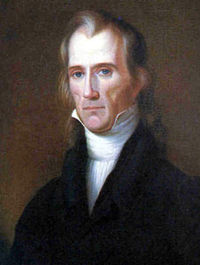Hugh Lawson White Senator
Hugh Lawson White (October 30, 1773 – April 10, 1840) was a prominent American politician during the first third of the 19th century. He succeeded Andrew Jackson and served in the United States Senate, representing Tennessee, from 1825 until his resignation in 1840, and was a Whig candidate for President in 1836. He also served as a state supreme court justice, and president of the Knoxville branch of the Bank of Tennessee.An ardent strict constructionist and lifelong states' rights advocate, White was one of President Jackson's most trusted allies in Congress in the late 1820s and early 1830s. White fought against the national bank, tariffs, and the use of federal funds for internal improvements, and led efforts in the Senate to pass the Indian Removal Act of 1830. In 1833, at the height of the Nullification Crisis, White, as the Senate's president pro tempore, coordinated negotiations over the Clay compromise.Suspicious of the growing power of the presidency, White began to distance himself from Jackson in the mid-1830s, and realigned himself with Henry Clay and the burgeoning Whig Party. He was eventually forced out of the Senate when Jackson's allies, led by James K. Polk, gained control of the Tennessee state legislature and demanded his resignation.
Search
Politician
| office | President pro tempore of the United States Senate |
|---|---|
| party | |
| relation | |
| successor |
